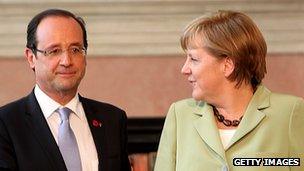Eurozone crisis: The European divide
- Published
- comments

The French and German leaders do not share a vision for the EU - largely echoing their predecessors
As this week's European summit approaches, the frequency of meetings increases. The finance ministers of Italy, Spain, Germany and France will meet in Paris this evening. The following evening Chancellor Merkel will be in Paris for dinner with the French President Francois Hollande.
At every turn, the eurozone crisis is deepening. The borrowing costs for Spain and Italy remain dangerously high. Cyprus has become the fifth eurozone country needing emergency help. More Spanish banks have been downgraded.
Many believe that Spain itself - not just its banking sector - will need rescuing. Greece wants to renegotiate the terms of its bailout agreement. Growth, for many countries, remains elusive.
At this critical time, France and Germany are on different pages. It has generally been true that the European project has been driven forward when France and Germany are in step. They are not at the moment. There is a deep philosophical and political divide between them.
It is not just that President Hollande has made growth rather than austerity his priority. He has openly challenged the German strategy of "austerity first". The two countries can skirt around these differences. The German Chancellor said on Friday that growth and stable finances are two sides of the same coin.
Sharing risk
The core argument relates to how to fix the crisis. President Hollande believes in "solidarity", where the debt of eurozone countries becomes common debt, so reducing the borrowing costs of the weaker countries. He favours a banking union, with not just central supervision of big banks but with joint guarantees for banking deposits. A bank failure in one country would not be allowed to spread across borders.
The French president wants the eurozone's bailout funds to buy sovereign bonds of troubled states on the open market.
The Germans see most of these ideas as increasing the liabilities of German taxpayers. Further down the road Angela Merkel may support some of these plans, but only after there is much closer economic integration, particularly over tax and spending. Only then might she have the confidence to put Germany's finances on the line. The German Chancellor believes this will involve eurozone states having to hand over sovereignty over national budgets and economic policies to EU institutions.
In Rome on Friday she summed up her approach as "no extra liabilities without control".
President Hollande, aware that a majority in France does not want to see more power going to Brussels, wants solidarity first - then he might just be able to sell transferring more sovereignty.
So the impasse.
Integration drive
In the background the European Commission, the President of the European Council Herman Van Rompuy, the head of the eurozone countries, Jean-Claude Juncker, and the European Central Bank have been preparing proposals for the summit. Their instincts are for closer integration. , external
They are considering proposing that Brussels would be able to rewrite the budgets of states that break the rules on deficits and debts. Under present plans Brussels can review budgets; this plan envisages countries being instructed to change their budgets. Such a radical step - with huge consequences for democracy - would effectively turn Brussels into a finance ministry.
The officials believe that such drastic steps may be the price to get the Germans to drop their resistance to pooling debt through eurobonds. If these plans were approved, the Germans are hinting, they would require treaty changes and a referendum in Germany.
But the divide between France and Germany goes deeper.
It was summed up this week by the German Finance Minister Wolfgang Schaeuble. "We have to fight the causes," he said. "Anyone who believes that money alone or bailouts or any other solutions, or monetary policy at the ECB - that will never resolve the problem. The causes have to be resolved."
The Germans believe troubled countries have to be fundamentally reformed - deficits cut, spending reined in, borrowing curtailed, public finances pruned, working practices made more flexible, and industry made more competitive.
The new French administration and the Germans have different instincts. Yesterday the French discovered a shortfall in their accounts of between seven and 10 billion euros. French Finance Minister Pierre Moscovici was quick to say "I object to all talk of austerity". In France there will be no painful spending cuts. If France is to bring its deficit down to 3% by 2013 - as promised - then taxes will have to rise.
But Paris is clear: it wants no fundamental reforms that challenge its way of life or which might stir its unions into protest.
Democracy question
Make no mistake, if some of these proposals gain ground Europe would change fundamentally. It would have taken a giant step towards a fiscal union, with profound implications for democracy. President Clinton understood that when it came to elections it was "the economy, stupid!" Tax and spending defines a government and determines how people vote.
But how would voters register their disapproval when Brussels had the right to dictate changes? Who would be held accountable?
An almost dismissive approach to the wishes of the voters can be detected over the demands by the new Greek government to renegotiate its bailout deal. This was the response from Angela Merkel's spokesman: "A programme has been agreed upon," he said, "a programme goes for every government, no matter if it is a new government, and the programme is the best way to see Greece return to economic health".
It raises a simple question: if a new government cannot change its policies what is the point of voting for it?
In desperate times, in the rush to save the single currency, democracy may be the casualty.